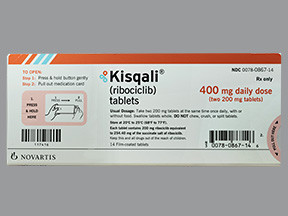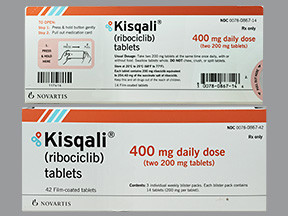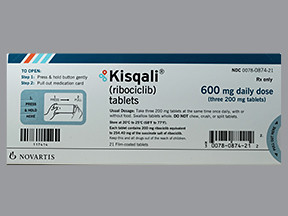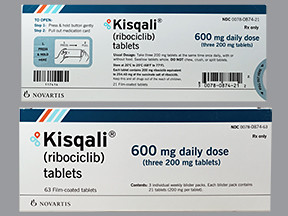RIBOCICLIB - ORAL
PHONETIC PRONUNCIATION: (RYE-boe-SYE-klib)
COMMON BRAND NAME(S): Kisqali
GENERIC NAME(S): ribociclib succinate
Uses
USES: Ribociclib is used to treat breast cancer in women after menopause. It works by slowing or stopping the growth of cancer cells.
How to use RIBOCICLIB - ORAL
HOW TO USE: Read the Patient Information Leaflet if available from your pharmacist before you start taking ribociclib and each time you get a refill. If you have any questions, ask your doctor or pharmacist. Take this medication by mouth with or without food as directed by your doctor, usually once daily in the morning for 21 days, then stopping the medication for 7 days. This is one cycle of treatment. Continue taking the medication this way as directed by your doctor. Swallow the tablet(s) whole. Do not crush, chew, or break the tablet(s). Also, do not take a tablet that is damaged or broken. If you vomit after taking a dose, do not take another dose at that time. Take your next dose at the regular time. The dosage is based on your medical condition, response to treatment, lab tests, and other medications you may be taking. Be sure to tell your doctor and pharmacist about all the products you use (including prescription drugs, nonprescription drugs, and herbal products). Use this medication regularly to get the most benefit from it. To help you remember, take it at the same time each day. Do not increase your dose or use this drug more often or for longer than prescribed. Your condition will not improve any faster, and your risk of serious side effects will increase. Avoid eating grapefruit or pomegranate, and avoid drinking grapefruit juice or pomegranate juice while taking this medication unless your doctor or pharmacist says you may do so safely. Grapefruit or pomegranate can increase the chance of side effects with this medicine. Ask your doctor or pharmacist for more details. Since this drug can be absorbed through the skin and lungs and may harm an unborn baby, women who are pregnant or who may become pregnant should not handle this medication or breathe the dust from the tablets.
Side Effects
Precautions
Interactions
Overdose
Images

- color
- light greyish violet
- shape
- round
- imprint
- RIC, NVR

- color
- light greyish violet
- shape
- round
- imprint
- RIC, NVR

- color
- light greyish violet
- shape
- round
- imprint
- RIC, NVR

- color
- light greyish violet
- shape
- round
- imprint
- RIC, NVR

- color
- light greyish violet
- shape
- round
- imprint
- RIC, NVR
Reviews
Faq for RIBOCICLIB - ORAL
Ribociclib is a prescription medication that is used to treat certain types of breast cancer in women. It belongs to a class of drugs known as CDK4/6 inhibitors.
Ribociclib works by inhibiting the activity of specific proteins called CDK4 and CDK6, which are involved in promoting the growth of cancer cells. By blocking these proteins, ribociclib helps to slow down or stop the growth of cancer cells.
Ribociclib is primarily used in combination with other medications to treat certain types of breast cancer that are hormone receptor-positive and HER2-negative. It is often prescribed in combination with letrozole, an aromatase inhibitor.
Ribociclib is taken orally as a tablet, usually once daily with or without food. The dose may vary depending on individual factors, so it is important to follow the instructions provided by the healthcare provider.
Common side effects of ribociclib may include nausea, fatigue, diarrhea, hair thinning, constipation, rash, and decreased appetite. It is important to report any severe or persistent side effects to a healthcare professional.
Ribociclib may harm an unborn baby, so it should not be used during pregnancy. It is important to use effective contraception during treatment and for some time after discontinuing ribociclib. The safety of ribociclib during breastfeeding is not known, therefore, it is advisable to avoid breastfeeding while taking the medication.
If a dose of ribociclib is missed, it should be taken as soon as remembered, unless it is close to the next scheduled dose. In that case, the missed dose should be skipped and the regular dosing schedule should be continued. It is important not to double the dose to make up for a missed one.
Ribociclib can interact with other medications, including certain antibiotics, antifungal drugs, and HIV medications. It is important to inform the healthcare provider about all medications being taken, including over-the-counter drugs and herbal supplements, to avoid potential drug interactions.
The duration of ribociclib treatment can vary depending on individual factors, including the stage and response to treatment. The healthcare provider will determine the appropriate duration of therapy based on the individual's condition.
Disclaimer
IMPORTANT: HOW TO USE THIS INFORMATION: This is a summary and does NOT have all possible information about this product. This information does not assure that this product is safe, effective, or appropriate for you. This information is not individual medical advice and does not substitute for the advice of your health care professional. Always ask your health care professional for complete information about this product and your specific health needs.
No Reviews Yet